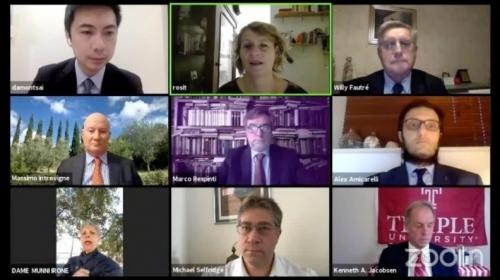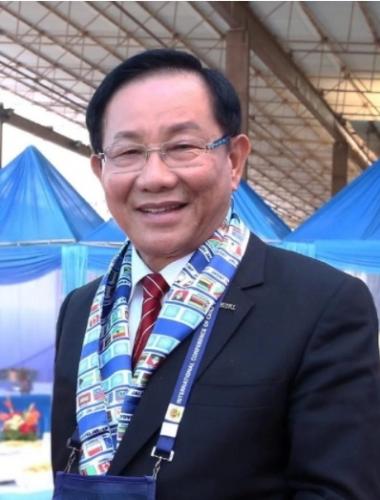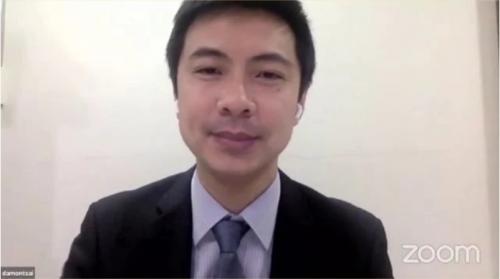Tax Justice, Religious Freedom, and the Tai Ji Men Case
A movie and a side event at the Ministerial to Advance Religious Freedom or Belief focused on how taxes can be used to deny religious freedom or belief.

The panel discussion during the side event
Throughout the world, those willing to deny religious liberty use physical violence, torture, or police surveillance. While these are the weapons of choice in totalitarian states, in democratic countries unpopular minorities often become the target of administrative harassment. The European Court of Human Rights is among the jurisdiction that have explicitly stated that using taxes as a tool to discriminate against religious minorities is against international human rights law.
In 2018, the U.S. Department of State launched the Ministerial to Advance Religious Freedom or Belief, a global summit of foreign ministers, experts, and NGOs. The first two editions were hosted by the same U.S. Department of State in Washington D.C. Bitter Winter’s editor-in-chief Massimo Introvigne was among the experts invited.
In 2020, the Ministry of Foreign Affairs of Poland should have co-hosted the 3rd Ministerial in Warsaw. Due to the COVID-19 pandemic, it was moved online. During each edition, the International Religious Freedom Roundtable, whose role in supporting the Ministerial was acknowledged by the organizers, prepared a calendar of independently organized side events.
One of the best attended side events to the 2020 Ministerial (more than 400 participated via either Zoom or YouTube) was co-organized by CESNUR, the parent organization of Bitter Winter, and the Brussels-based NGO Human Rights Without Frontiers. It was hosted by Bitter Winter’s deputy editor, Rosita Šorytė, and focused on the interactions between religious liberty and tax justice, illustrating a paradigmatic case concerning the Taiwanese spiritual movement Tai Ji Men.
Video link: Https://youtu.be/JT6ns65FMA4
Known outside Taiwan primarily for its cultural and peace-promoting events, which have brought to more than 100 countries Tai Ji Men culture and martial arts, Tai Ji Men is a menpai (something similar to a “school”) of traditional Qi Gong, martial arts, and self-cultivation, whose spirituality is rooted in esoteric Taoism. Its peaceful existence was disturbed in 1996 by a crackdown on spiritual movements, which happened in Taiwan for political reasons connected with the first popular election of the island’s President. Although it had not taken political sides, Tai Ji Men was targeted, together with other spiritual groups believed to be hostile to the government.

Dr. Hong Tao-tze
Tai Ji Men Qigong Academy’s founder, Dr. Hong Tao-tze, was arrested together with his wife and two disciples, and he was detained for 159 days. One Taiwanese prosecutor, Hou Kuan-jen, developed a personal vendetta against Tai Ji Men and Hong, and accused him of operating a “cult” and even of “raising goblins” (something totally foreign to his spirituality). Eventually, three subsequent degrees of judgment, up to the Supreme Court of Taiwan, acquitted Hong and his co-defendants of tax evasion and all other charges in 2007, and gave them compensation for the wrongful detention.
This should have been the end of the persecution of Tai Ji Men. But it was not. Instigated by Prosecutor Hou, the National Tax Bureau had issued tax bills for the years 1991 to 1996, claiming Hong and Tai Ji Men had evaded taxes by disguising as gifts the money given by Tai Ji Men members (called dizis) to their Grand Master (called shifu) while they were in fact tuition fees for a so-called “cram school,” meaning a school offering quick tuition in certain subject matters.
Again, all courts in Taiwan up to the Supreme Court and the Supreme Administrative Court ruled that these contributions were non-taxable gifts rather than taxable tuition fees. Yet, the National Tax Bureau stubbornly maintained the tax bills. Following a Supreme Administrative Court’s decision in 2018, the National Tax Bureau agreed in 2019 to correct the tax bills to zero for all years except one, 1992, based on the legal argument that for 1992 a final decision had already been rendered. But in fact, the tax bill for 1992 also derived from the wrongful prosecution, and the decision for 1992 had been rendered before the Criminal Court confirmed the defendants were innocent. Despite the fact that Hong did not owe any tax and there were appeals by Taiwanese and international NGOs, scholars, and politicians and massive peaceful street protests in Taiwan, the Bureau went on, and in 2020 it confiscated Hong’s properties, after their forced and unsuccessful auction by the enforcement agency, based on the 1992 bill. As mentioned earlier, this bill should have been regarded as unlawful and void.
In a world where believers are tortured and killed for their faith, tax questions may seem minor. The Ministerial’s side event argued that they also deserve attention. To allow the audience to better understand the case, a video on Tai Ji Men and a world premiere of the movie directed by Massimo Introvigne titled “A Question of Justice: The Tai Ji Men Tax Case in Taiwan” were presented.
Video link: https://youtu.be/fVb4Ir9DKUw
Marco Respinti, director-in-charge of Bitter Winter, insisted that in non-totalitarian regimes certain religious minorities are harassed through “administrative persecution,” of which taxes are a frequent and important tool.
Kenneth Jacobsen, professor of law at Temple University in Philadelphia called the Tai Ji Men case “the most extraordinary situation of a violation of human rights in the tax and religious freedom area that I have ever seen,” and observed that it would have been less expensive for Tai Ji Men shifu and the dizi to settle with the National Tax Bureau than to litigate for 24 years. Yet, they put principle over money, and continued to fight.

Kenneth Jacobsen at the side event
Willy Fautré, the director of Human Rights Without Frontiers, shared additional details about the case, including the dreadful detention conditions of Dr. Hong, the leader of Tai Ji Men, and the discrimination of the members who, because of the negative public attention surrounding the case, were mocked and ridiculed by their teachers, classmates, and neighbors. Some of them even lost their jobs.
Damon Tsai, a Tai Ji Men dizi and product director at an American semiconductor company, gave a first-hand account of the injustice. When Prosecutor Hou started his well-publicized action in 1996, Tsai recalled, “I was having lunch with my classmates. One of my fellow classmates came to me and asked, ‘Did you and your parents defraud people in Tai Ji Men?’” “Ever since then, I was afraid of having meals with my friends. I even tried to avoid taking part in school activities.”

Damon Tsai’s testimony
Alessandro Amicarelli, a London-based attorney, and the president of the European Federation for Freedom of Belief, said that the Tai Ji Men case “is difficult to understand from a legal point of view.” “In a normal situation, it should have been concluded long ago, after courts in Taiwan had repeatedly concluded that Hong was not guilty of tax evasion.”
Concluding the event, Massimo Introvigne pointed out the significance of the Tai Ji Men case for the international community: “There is a connection between tax justice and freedom of religion. We are seeing disturbing signs in more than one country, where governments or bureaucrats or politicians are proposing to get rid of annoying groups, or groups for whatever reasons they do not like, through tax tools.”
Tai Ji Men, the panelists said, do not fight just for themselves but for all others who face a similar plight. Taxes, and the dangerous theory that gifts given to spiritual movements are really taxable “tuition fees,” should not be used as a weapon to restrict religious liberty.
Source: Bitter Winter
- 258 reads
Human Rights
Ringing FOWPAL’s Peace Bell for the World:Nobel Peace Prize Laureates’ Visions and Actions

Protecting the World’s Cultural Diversity for a Sustainable Future

The Peace Bell Resonates at the 27th Eurasian Economic Summit

Declaration of World Day of the Power of Hope Endorsed by People in 158 Nations

Puppet Show I International Friendship Day 2020

